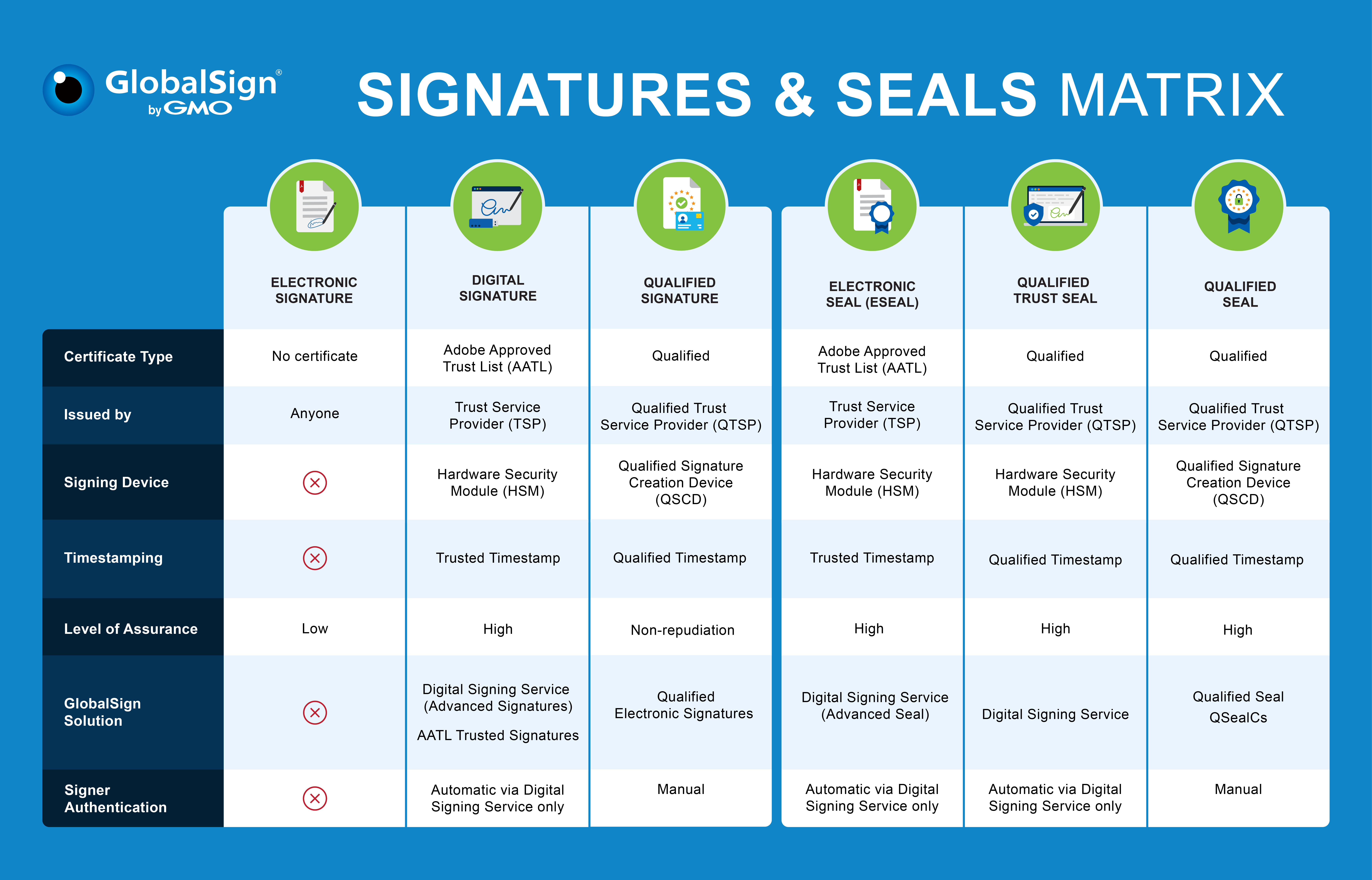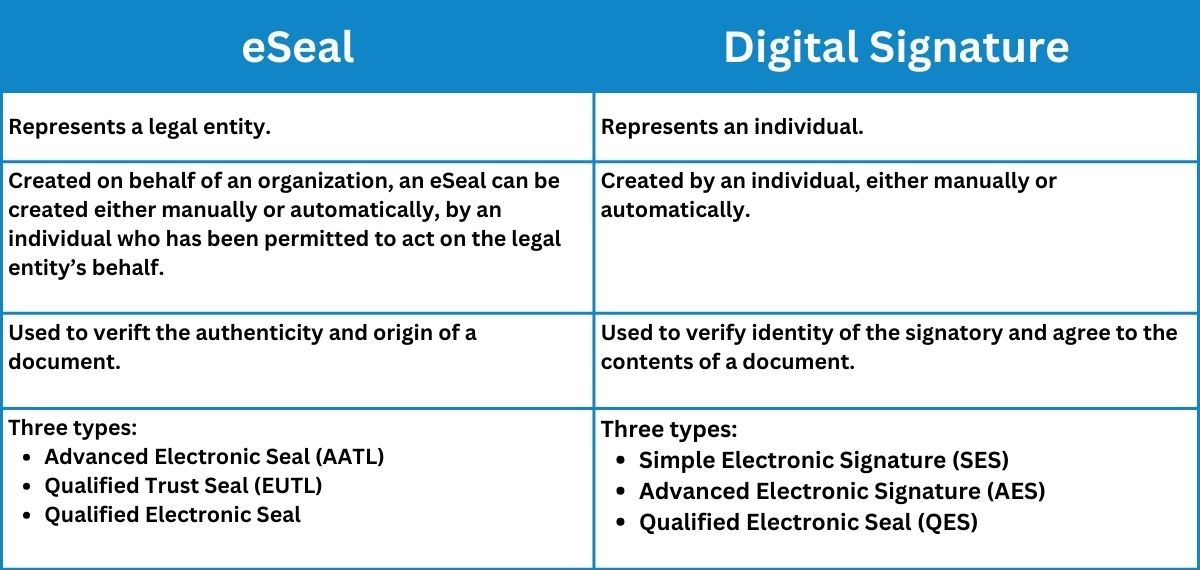Wind the clock back a few (hundred!) years and a wax stamp was the only seal of approval a business needed to secure their documents by proving that the document had not been tampered with. Fast forward to today where digital documents drive business transactions, seals have also received a digital upgrade.
But what are they, how do they differ between signatures and how can they be used within your business? Let’s take a look at all this and more.
- What is an Electronic Seal or eSeal?
- What’s the Difference Between an eSeal and Digital Signature?
- What are the Different Types of eSeals?
- Why Should Enterprises Use eSeals?
- What Type of Documents Should eSeals Be Used For?
- How to Create a Company Electronic Seal
- How GlobalSign’s eSeals Keep Your Documents Secure
What is an Electronic Seal or eSeal?
An electronic seal, or eSeal is a digital version of a corporate seal, which verifies the origin of an electronic document. eSeals are built on Public Key Infrastructure (PKI) technology, which supports the validity, integrity and security of the eSeal.
In order to generate an eSeal, a legal entity needs to be vetted and authenticated through a third party, or through a remote identity verification process. Like its digital signature counterpart, an eSeal is backed by a digital certificate which ‘seals’ data, sensitive documents, and other communications to ensure they are tamperproof and originate from a trustworthy source.
Below is a matrix, which displays the different variations of signing options available.

What’s the Difference Between an eSeal and Digital Signature?
Whilst a digital signature is used to represent an individual, an eSeal represents a legal entity or organization. There is a common purpose for the use of both digital signatures and eSeals, but there are also a number of key differences:

What are the Different Types of eSeal Certificates?
Traditionally, there are two different types of e-seals, Advanced and Qualified. Both eSeals meet the requirements set out in the eIDAS Regulation Article 36 but Qualified Electronic Seals provide a higher standard of security. They are verified with a qualified certificate and a Qualified Signature Creation Device (QSCD), and offer the highest level of assurance to the document applied to.
In 2023, GlobalSign introduced another option to the market, Qualified Trust Seals. Qualified Trust Seals’ are similar to Advanced Electronic Seals, however, the key difference is they are issued using a qualified certificate. Because of this, they carry the identity trust up to a qualified level that is compliant with the eIDAS regulation (910/2014 Annex III) and are EUTL trusted. . Because of this, they carry the trust up to a qualified level that is compliant with the eIDAS regulation (910/2014 Annex III) and are EUTL trusted.
With a new level of eSeal introduced, it’s important to understand the key differences between the sealing options:

Why Should Enterprises use eSeals?
Enterprises should consider using eSeals as they provide an extra level of security for organizational documents by providing the following benefits:
- Unique to each entity – after a thorough vetting process an organization is granted a digital certificate which is tied to their electronic seal
- Provides document integrity – Use of cryptographic components ensures document content is locked and sealed. Because of this secure signing process, in order to change the document, the seal must be broken and if the seal is broken any changes made will be instantly detected
- Provides confidence about who created a document – Only those permitted to use the seal can sign a document. Furthermore seals can be timestamped, which shows the exact time and date the seal was applied
- Ensures organization documents are legally compliant – eSeals create a timestamped, tamper-evident document and adds assurance around who created it and when - all of which play a role in establishing audit trails, various regulatory compliance, and legal tenability
- Accelerates digital document signing processes – eSeals speed up business transactions, saving time and administrative costs
What Type of Documents Should eSeals Be Used For?
When an organization needs to sign large volumes of documents (otherwise known as bulk signing), eSeals can be used to automatically sign documents at high speed. All businesses, whether they are large enterprises or SME’s have the need to process and distribute electronic documents. Some of the most common use-cases for eSeals include:
Sealing automatically generated documents such as:
- eInvoicing
- eArchiving
- eStatements
- eBills
- eReceipts
Ensuring the integrity and origin of sensitive data to create tamperproof documents, for example:
- Intellectual Property
- Quotations
- Financial Reports
- Medical Reports
How to Create a Company Electronic Seal
If you already know what type of eSeal your organization needs, then it is a good idea to do some research before you select a Certificate Authority (CA). The selected CA should support your organization’s needs for implementing an eSeal, including compliance, integrity and above all trust.
When creating an eSeal, it is best practice to create a seal matrix as an overview of what your organization needs out of your eSeal. This will include the level of trust required, local compliance regulations for your organization, level of compliance, and the applicable signing workflow.
If you are unsure what kind of seal your organization needs, ensure to partner with a trusted CA to work with you to identify and select the best solution for your requirements.
How GlobalSign’s eSeals Keep Your Documents Secure
If you have a high-volume signing workflow, or have automated signing needs, you want a solution which generates large volumes of trusted seals for existing document workflows and applications across businesses. With GlobalSign’s Digital Signing Service (DSS), a simple REST API can be used and organizations can quickly deploy eSeals with minimal development or overhead needed, and no on-premise hardware to manage. Since January 2023, our Digital Signing Service has generated over 32 million signatures, with approximately 75% of those being seals.
Our Qualified Trust Seal offering is powered by DSS and enables organizations to automatically deploy seals to any signing application, with the added value of being trusted by the European Union Trust List (EUTL) and accredited to deliver the highest level of compliance for identity assurances as per the EU eIDAS regulation.







